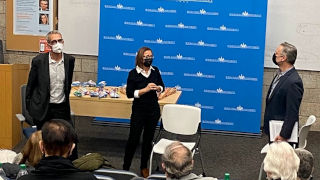Documentary About Refugee Crises Highlights Storytelling as Agent of Meaningful Change - Seton Hall University
Thursday, December 16, 2021

The documentary presents a dual perspective — first about the refugee drama and then about the challenges faced by local populations left to cope with immigrants flooding small towns challenged by depleted resources.
Two parallel family stories dominate the narration of a crisis that unfolded from Africa and the Balkans. Aregai, an Eritrean refugee who survived the sinking of a migrant boat off the coast of Lampedusa in 2013, is one of the main characters in an underground journey from Italy to Sweden to seek political asylum.
A Syrian family fleeing the war in Damascus dominates the other part of the story. The film follows the journey of Wael, his wife, Doha, their four young children and three nephews. The family crosses the 2,500-mile "informal" Balkan route through border crossings, checkpoints and refugee centers and endures difficult travel conditions. Ultimately the family arrives safely in Hannover, Germany, where they reunite with Wael's brother and start a new life that provides schooling and opportunities for the younger generation.
The screening was followed by a panel discussion with the film's editors and directors, Lorena Luciano and Filippo Piscopo, led by Jeffrey M. Togman, Ph.D., political science professor and producer of award-winning documentaries.
Luciano and Piscopo discussed the emotional and technical difficulties of filming in high-risk locations and contexts. Piscopo said the technical constraints of filming in these places were overcome by using simpler technology: cell phone cameras, WhatsApp software and GPS-enabled applications that allowed his crew to track the sometimes-elusive location of migrants. Luciano discussed the emotional distress she experienced when she was unable to help people who were lacking food, shelter and other simple necessities.
The documentary offers room for reflection as it explores an incredible human tragedy — asylum seekers hesitantly leaving their beloved countries not just to seek a better future, but to stay alive. Wael's reluctancy to start his family's journey was abruptly overcome when a bomb half-destroyed his apartment building while his children were inside. Conversely, viewers cannot fail to empathize with communities that are unable to manage a large influx of needy migrants without any real support from local and state governments.
Asked about the policy impact they would like their documentary to make, Luciano and Piscopo were unequivocal: Change is difficult, especially in policymaking. But filming stories like theirs is a step toward raising awareness through public opinion shapers. They believe these opinions will eventually redefine culture.
They are proud that their stories gave a voice to asylum seekers and local asylum providers, as this ultimately will affect awareness and transformation. It may eventually change the hearts of peripheral characters in this evolving global story: nationalist movements that oppose and denounce immigration policies and practices. The chaos that ensued in Italy in the aftermath of the shipwreck contrasts starkly with the orderly and organized opportunities that asylum seekers find in northern European countries. This denotes the need for better coordination across the European Union.
Socially conscious documentaries, photo-journalism, carefully crafted storytelling and preparing students for filming and producing powerful and honest narratives is a goal of the Film and TV Program in the College of Communication and the Arts.
"Students in the Film, Media Studies, and TV Production concentrations are encouraged to explore socially conscious topics that emphasize the complex intersection of media, culture and society on a global stage," said Interim Dean Renee Robinson, Ph.D. "Students create short films, documentaries and other production artifacts that thoughtfully depict stories of the human experience while using media as vehicles for making change in the world."
Learn more about the Visual and Sound Media Program here.
Gabriella Romani, Ph.D., Italian Studies professor and Director of the Charles and Joan Alberto Italian Studies Institute, which co-sponsored the event with the Office of the Provost, said It Will Be Chaos was a moving and enlightening documentary that showed both the complexity and the human face of migration. It was a reminder that behind migration data there are real people, among them children, with real stories of suffering and resilience with which we can all identify.
Categories: Arts and Culture






